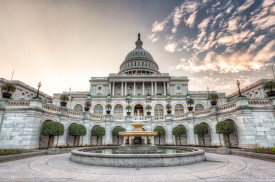
Yesterday, the US Senate failed to break a filibuster against extending unemployment benefits and providing aid to states.
Under the undemocratic and historically accidental rules of the Senate, it takes 60 votes to end debate in the Senate. The majority mustered 56. (40 voted against ending debate, four didn’t vote.)
Whatever you believe about this particular legislation, supermajority rules are no way to govern a sophisticated, diverse industrial democracy in a fast-changing global economy, especially when the supermajority requirement is piled on top of a representation system that absurdly exaggerates the influence of small-population states. The 56 Senators who voted to break the filibuster represented not 56 percent of the electorate but 62 percent. Senators voting to sustain the filibuster represented just 36 percent.
In any other industrial democracy, representatives of 62 percent of the electorate could easily implement their legislative agenda. Time to fix the Senate.








MicheLynne
I’m finding your “Game Changers” series to be highly educational.It is also piquing my curiosity. So, just for fun, I Googled for additional news articles about yesterday’s Republican filibuster. Breezing through the articles that came up, they basically shared your sentiment about how “unfortunate” yesterday’s filibuster was. However, when I see readers’ comments such as those posted on The New Haven Register’sweblog, I get the impression that the US Senate *does* need to have more debate, since the country itself seems deeply divided right now.So, maybe in this particular case, the filibuster is a good thing because it is forcing further debate among the Senators?
Alan Durning
The Oregonian reports on the 9 percent cross-the-board budget cuts the state of Oregon is triggering, as a result of this filibuster. The bill in question would provide emergency budget assistance to states.
MicheLynne
Ah, Oregon, a state near and dear to my heart—Go Ducks! :-)Looks like the filibuster is also encouraging the needed nation- and state-wide debates (as the filibuster intended, it seems). For instance, consider these four paragraphs from the Oregonian article:Republicans renewed their call Tuesday for the Oregon Legislature to convene in special session to deal with the budget emergency. “I agree with the governor that the state can no longer wait to rebalance the current budget,” said House Minority Leader Bruce Hanna, R-Roseburg. “We can’t count on the federal government to provide yet another bailout. The longer we wait, the more painful these decisions will become. ” Democratic legislative leaders didn’t rule out a special session Tuesday. In statements, House Speaker Dave Hunt, D-Gladstone, and Senate President Peter Courtney, D-Salem, said they cared about preserving schools and services to vulnerable Oregonians. Both have said they want to wait until Congress acts—or doesn’t—and Oregon gets its next revenue forecast in late August.”Also, consider the relatively good news in these two paragraphs from the article:Some Oregon agencies will get away without deep cuts… Surging enrollments and increased tuition and fees have helped offset cuts for the state’s universities and community colleges. Road and transportation projects will go on as scheduled because they’re financed by vehicle fees and gas taxes.
MicheLynne
[oops, didn’t mean to put a ” mark, at the end of that 4th paragraph in the block-quote!]
MicheLynne
[however…should’ve probably used the “run-in” style instead of attempting the “block quote” style that a Sightline staff member (ahem, Clark) suggested to me several years ago…:-)]
Alan Durning
The Senate minority has again blocked this measure. Again, despite the votes of Senators representing 62 percent of the United States. http://www.nytimes.com/2010/06/25/us/politics/25jobs.html?hp
MicheLynne
Doesn’t America always make room for vocal minorities? Isn’t that the American Way? Hopefully the best policies will be enacted through healthy debate between *both* parties now.The Wall Street Journal makes a good point about the results of today’s filibuster brought on by the Republicans, among others, who are arguing that the best way to help the economy is by making the deficit reduction a higher priority, instead of funding more government bailouts:”The sudden move by Congress provides an unexpected test of that argument.”[btw, meant no offense at all toward Clark! just looking forward to the day when Sightline’s weblog can support html tags for block quotes in comments!]